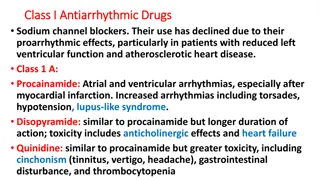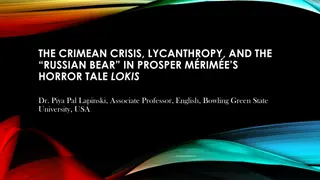
Targeted Therapy in Cancer Treatment
Targeted therapy in cancer treatment involves using drugs to target specific genes and proteins in cancer cells, aiming to inhibit their growth and spread without harming healthy cells. This approach differs from traditional chemotherapy and holds promise in treating various types of cancer. Genetic engineering is also advancing cancer treatment by reprogramming the immune system to recognize and eliminate cancer cells through innovative gene transfer techniques.
Download Presentation

Please find below an Image/Link to download the presentation.
The content on the website is provided AS IS for your information and personal use only. It may not be sold, licensed, or shared on other websites without obtaining consent from the author. If you encounter any issues during the download, it is possible that the publisher has removed the file from their server.
You are allowed to download the files provided on this website for personal or commercial use, subject to the condition that they are used lawfully. All files are the property of their respective owners.
The content on the website is provided AS IS for your information and personal use only. It may not be sold, licensed, or shared on other websites without obtaining consent from the author.
E N D
Presentation Transcript
CRIMEAN FEDERAL UNIVERSITY CELLBIOLOGY DEPARTMENT LUNG CANCER SUDHARMMA ANJALI LA2-CO-215(1)
THE CONCEPT OF TARGETED THERAPY.WHAT IS IT USED FOR. Targeted therapy is a type of cancer treatment. It uses drugs to target specific genes and proteins that help cancer cells survive and grow. Most types of targeted therapy help treat cancer by interfering with specific proteins that help tumors grow and spread throughout the body. This is different from chemotherapy, which often kills all cells that grow and divide quickly.
Targeted therapy helps healthcare providers treat cancer cells without hurting healthy cells. Healthcare providers have developed more than 80 targeted therapies to treat many kinds of cancer. Sometimes, they use targeted therapy as the front line or initial treatment.
THE MAIN PRINCIPLE OF ACTION OF TARGETED THERAPY DRUGS The principle behind targeted therapy is utilizing therapeutics designed to interfere with specific molecules that have a relatively specific or higher expression profile in cancer cells and are critical for cancer growth and progression. These were designed as mechanistic therapeutics in the form of small molecules and monoclonal antibodies.
The targeted therapy drug that is first used to treat advanced or metastatic non small cell lung cancer that is ALK positive is crizotinib (Xalkori). If the cancer stops responding to crizotinib, or if you can't take crizotinib, these targeted therapy drugs may be used: ceritinib (Zykadia) alectinib (Alecensaro).
GENETIC ENGINEERING APPROACHES TO THERAPY Medical researchers are using genetic engineering to revolutionise the treatment of cancer. Developments in genetic engineering make it possible to 're-programme' the human immune system so that T cells white blood cells that normally fight viruses recognize and kill cancer cells. Gene transfer is a new treatment modality that introduces new genes into a cancerous cell or the surrounding tissue to cause cell death or slow the growth of the cancer. This treatment technique is very flexible, and a wide range of genes and vectors are being used in clinical trials with successful outcomes.
CLASSES OF TARGETED THERAPY DRUGS,NOMENCLATURE Osimertinib, crizotinib etc.. are some of the targeted therapy drugs used to treat lung cancer. Targeted therapy is also known as precision medicine or personalized medicine. The two main groups of targeted therapy drugs are monoclonal antibodies and small molecule inhibitors.
MONOCLONAL ANTIBODIES Monoclonal antibodies are immune system proteins that are created in the lab. Antibodies are produced naturally by your body and help the immune system recognize germs that cause disease, such as bacteria and viruses, and mark them for destruction. Many monoclonal antibodies are used to treat cancer. They are a type of targeted cancer therapy, which means they are designed to interact with specific targets.
Some monoclonal antibodies mark cancer cells so that the immune system will better recognize and destroy them.
SMALL MOLECULES IN TARGETED THERAPY A drug that can enter cells easily because it has a low molecular weight. Once inside the cells, it can affect other molecules, such as proteins, and may cause cancer cells to die. This is different from drugs that have a large molecular weight, which keeps them from getting inside cells easily.
Targeted drugs can be roughly classified into two categories: small molecules and macromolecules (e.g., monoclonal antibodies, polypeptides, antibody drug conjugates, and nucleic acids). Compared with macromolecule drugs, small-molecule targeted drugs have advantages in some aspects such as the pharmacokinetic (PK) properties, costs, patient compliance, and drug storage and transportation
TARGETED PREPARATIONS FOR RECEPTORS AND LIGANDS Covalent or noncovalent attachment of a targeting ligand on the surface of nanoparticles enables them to recognize the specific antigens or receptors on target cells which subsequently engulf the particles through endocytosis. Tumor specific targeted drug delivery leads to accumulation of drug in the tumor region and decreases the drug leakage into other healthy organs. This approach increases treatment efficacy, while decreasing adverse effects
TARGETED DRUGS FOR KINASE SYSTEM Certain kinases are more active in some types of cancer cells and blocking them may help keep the cancer cells from growing. Kinase inhibitors may also block the growth of new blood vessels that tumors need to grow. Some kinase inhibitors are used to treat cancer. Tyrosine kinase signaling pathways normally prevent deregulated proliferation or contribute to sensitivity towards apoptotic stimuli. These signaling pathways are often genetically or epigenetically altered in cancer cells to impart a selection advantage to the cancer cells.






















